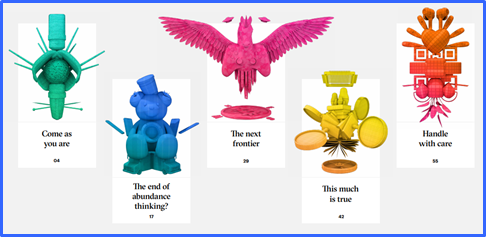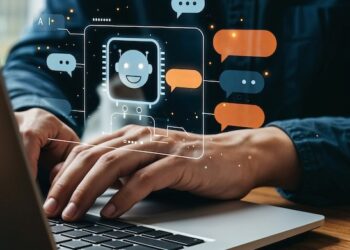Accenture’s Fjord Trends 2022 report looks at society and what is bubbling up organically from “designers and creatives around the globe and tell a story of people and their relationships with the planet, technology, brands, and each other”.
The online focus group comprised 585 participants in seven countries: South Africa, UK, USA, Brazil, China, India. The data was collected in September 2021.
There are five trends for 2022, each of which “stands on its own”, but there is a natural connection between them. The “dominant theme is about the need to respond to changes in all relationships – the threads that form the new fabric of life”. Here they are.

Come as you are
People are re-thinking their lives, “who they are and what matters to them”, and confidence in the self and revealing the true self is growing. Example: British diving champion, Tom Daley, knitting in the stands at the Tokyo Olympic Games. It is also seen in the so-called Great Resignation phenomenon that appeared in 2021, as people of all ages and in all sectors started to reconsider their lives during the Covid-19 lockdowns and reconsidered their priorities.
This “increased search for more agency and financial freedom” is driving the side-hustle economy, as technology makes this easier than before. People are increasingly finding ways to “turn themselves into” a business and earn +US$10k a year from teaching, writing, renting property, re-selling, freelance programming and the like. Example: Meta (Facebook) is set to pay content creators +US$1 billion by end 2022 to keep them driving the content, which drives the views, which drives the advertising, which … (You get the picture.)
The end of abundance thinking?
The global lockdowns that started in March 2020 had an impact on manufacturing and delivery of goods around the world. This problem was compounded by Ever Given lodging itself in the banks of the Suez Canal and disrupting supply chains “for months”. Many around the world then saw empty shelves in the stores for the first time in their lives and shortages of even the most basic goods (such as toilet paper) were seen. This situation has escalated following the outbreak of the Russia-Ukraine conflict and the wide and ongoing sanctioning that have resulted. Additional problems are the grounding of Ever Forward off Maryland (which has received little coverage by the media for some reason), problems with container availability, and the increasing problems with truck drivers and the cost of fuel.
Equally important, is the growing understanding and support for sustainability in all sectors, with customers are increasingly weighing up “the good of the planet with their families’ basic necessities” when shopping. This will increasingly impact on the ‘throw away’ mentality that has dominated for so long, with people constantly buying the newest and latest version/model/design instead of repairing/re-using/recycling in the past. Fashion, vehicles, digital devices and many other goods will be impacted. Example: “right to repair” rules have been put in place in the UK, and the European Commission has proposed a rule to add a charge for small electronic devices to encourage re-use of existing chargers.
All of this suggests that the “take, make, dispose” and repeat model is going to be replaced with a more circular “regenerative business” model.
The next frontier
The metaverse is developing from its gaming roots.
Let’s think about this ourselves for a moment and put the report aside. My first thought is that this is but another development to make inroads into the extremely lucrative gaming market. Also, it is obvious that the gushing articles about the metaverse are nothing more than press releases being pumped out by the big players, which are being published by many media outlets without any question, consideration or counter-narrative about this ‘next frontier’, which is being pushed by certain big tech players. But there is growing scepticism in certain circles, and many people have “more questions than answers”. Personally, the harder they push this, the more sceptical I’m becoming. Ditto NFTs.
This much is true
The era of myth and magic and believing everything one is told was replaced by the era of science and investigation and figuring out how things work. The current technology era is one of questions and questioning. Customers have lots of questions and the “channels for asking them is growing” apace. Brands that learn how to deal with this better will gain a competitive edge.
Consider Google. For 24 years it has allowed people to ask a question and receive an answer instantaneously by just typing a question into a computer. This leads to more questions and more platforms to answer questions – and then to ‘not’ answer questions by delivering disinformation. And the explosion of disinformation that is all around us is leading to people doubting more and more. In fact, the report states that trust has “been so tested that it’s created ‘Information Bankruptcy” – a state characterized by record-low levels of trust in all information”. This is leading to people “interrogating the sources of the answers”. Furthermore, “Incidences of inflammatory language, lack of integrity, misinformation and the politicization of everything are accelerating a decline in trust in experts and governments.”
In this regard, Edelman reports, “81% of shoppers say that trust impacts their buying decisions [while] just one-third trust the brands they buy from.” Brands need to pay attention to this issue as, “Delivering on customer demands for information is a way to show transparency, which builds credibility”.
Handle with care
At last, care is moving “center stage, reminding us of the importance of kindness and compassion. The many different aspects of care, the challenges of caring, and the cost and role of carers have become more visible and more widely discussed … How companies design for all aspects of care will likely set them apart, and be a key component for future success”.
According to the report, Covid-19 “wreaked havoc on mental health” worldwide and there is increasing willingness to discuss mental health to support each other. Example: the public disclosures by celebrities such as US gymnast Simone Biles.
Companies are starting to support their employees by appointing health officers and announcing ‘health closures’. Technology is crucial in this area, as it can be used to provide information portals, call centres, vlogs, blogs and more to help people cope. This area will grow exponentially as people become “more comfortable using a combination of digital and physical services to care for themselves and others”. Example: Spotify’s Wellness Packages.
There is a lot of detailed information in this report on what’s bubbling under and how we’re changing as a word. It’s well worth reading.
(Source: https://www.accenture.com/_acnmedia/PDF-169/Accenture-Fjord-Trends-2022-Full-Report.pdf#zoom=40














